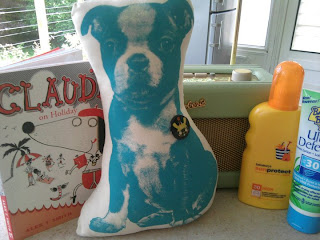Guest Post by Nicola Wilkinson - PR Fairy extraordinaire! on Literary Festivals!
Festival Events – are they worth the effort?
When my good friend the Book Sniffer asked for my advice on festival events, I was only too happy to share my views. So in a departure from the usual doggy doctrine, it’s time to get down to the serious business of festival events – are they a good idea?
When it comes to the question of literary festivals, there’s a lot to consider. For a start, festivals now reach every corner of the UK from the established names (Edinburgh, Cheltenham, Hay) to the boutique (Port Eliot Lit Fest) to dedicated Children’s festivals (Bath, NCBF). A conservative estimate would suggest that there are now around 250 literature festivals to choose from! And with regard to those with a children’s programme,, a whole host of questions are thrown up - audience; public or schools? Small intimate workshop or play to the crowd? There’s no doubt that for the 7-12 age group, festivals offer a chance to meet your fans but the younger age group is a much thornier issue. In an effort to make things simple, I’m going to concentrate on events for the 2-6 age group and share my pearls of wisdom:
Festival events; the basics
Every festival is unique but most don’t offer a full fee (The Society of Authors and Illustrators recommends £350 for a full day and £150 for a half day) and ask Publishers to cover travel and accommodation expenses. The upside is that the marketing is more powerful, brochures are usually mailed out in the local area and advertising etc is widespread. The larger festivals will have a media sponsor with opportunities for coverage.
The downside is that your event is one of many and you are not the featured attraction therefore diluting attention.
Listen To Your Publicist
With so many festivals out there, it’s crucial to know which one is right for you. Your publicist will have first hand experience of the festivals that have the right marketing in place and deliver on audience size and book sales. Not all children’s programmes are the same.
Don’t Bank on Book Sales
While I have seen sweeping queues of children waiting to get their book signed – it’s usually for more established authors who have a fanbase eager to get their hands on a new release. Events for the younger age group tend to be smaller for logistical reasons resulting in fewer sales (e.g. an audience of 20 might result in 25% sell through). Not to mention families having to rush off after the event for feeding or toilet needs! However, do remember to sign stock for the bookshop afterwards; as the saying goes, a signed book is a sold book!
Forget the nerves…
If the thought of standing in front of a row of small children brings on an attack of nerves, don’t panic! Nerves are a good thing and make you mentally ready! Your audience is happy to be there and they don’t expect a professional show. My own 2 girls are delighted with a visit to the local playgroup rather than having another day listening to Mummy and are thrilled with the odd nursery rhyme, collage and storytelling from the helpers at the church. Reading aloud is a wonderful thing and brings a book to life. If you don’t know where to start, keep things simple and have a series of building blocks to fall back on.
The Event
I’ve seen full-on shows to comedy routines and art activities rivalling Mister Maker! It’s important to remember to be true to yourself.. As corny as it sounds, it’s best to relax and enjoy the event and in turn, your audience will too. Young children are a hard audience and are easily bored. Most adults can’t hold their full attention for more than 5 minutes at a time and small toddlers are no exception! Introduce variety with visual elements.
A workshop event works well and this can range from a simple colouring activity to a more complicated creation to take home! This format will put a limit on numbers as it’s difficult to co-ordinate a large number of small children with glue sticks! For the larger audience, take a leaf out of the marvellous James Mayhew’s book – James does brilliant events for younger children involving powerpoint (visual aids are always a plus!) plus live drawing and storytelling on stage. James is amazing at drawing and storytelling at the same time. This is a tall order to imitate but take some tips – reading your picture book with the spreads up on screen help the kids to see and therefore feel part of the event. Plus children always enjoy seeing drawing live (extra points if you let the children suggest what you draw!). Storytelling is a must as a good session will not just entertain the audience but needs to leave them with a lasting impression of your book. Another suggestion is to make up some actions for the kids to act out through the story.
Picture Book events are usually advertised for 4+ but do expect families to bring along younger siblings. Be prepared for a mixed age group and you won’t be fazed.
In conclusion, festival events are lots of work and expense and no, they aren’t going to make you an overnight success or instantly push your book up the bestseller chart! However, they can help to raise your profile in a difficult market. A programme of events around publication (including schools, libraries and bookshops alongside festivals) is good, old-fashioned grassroots publicity and help to reinforce a successful PR campaign.
































